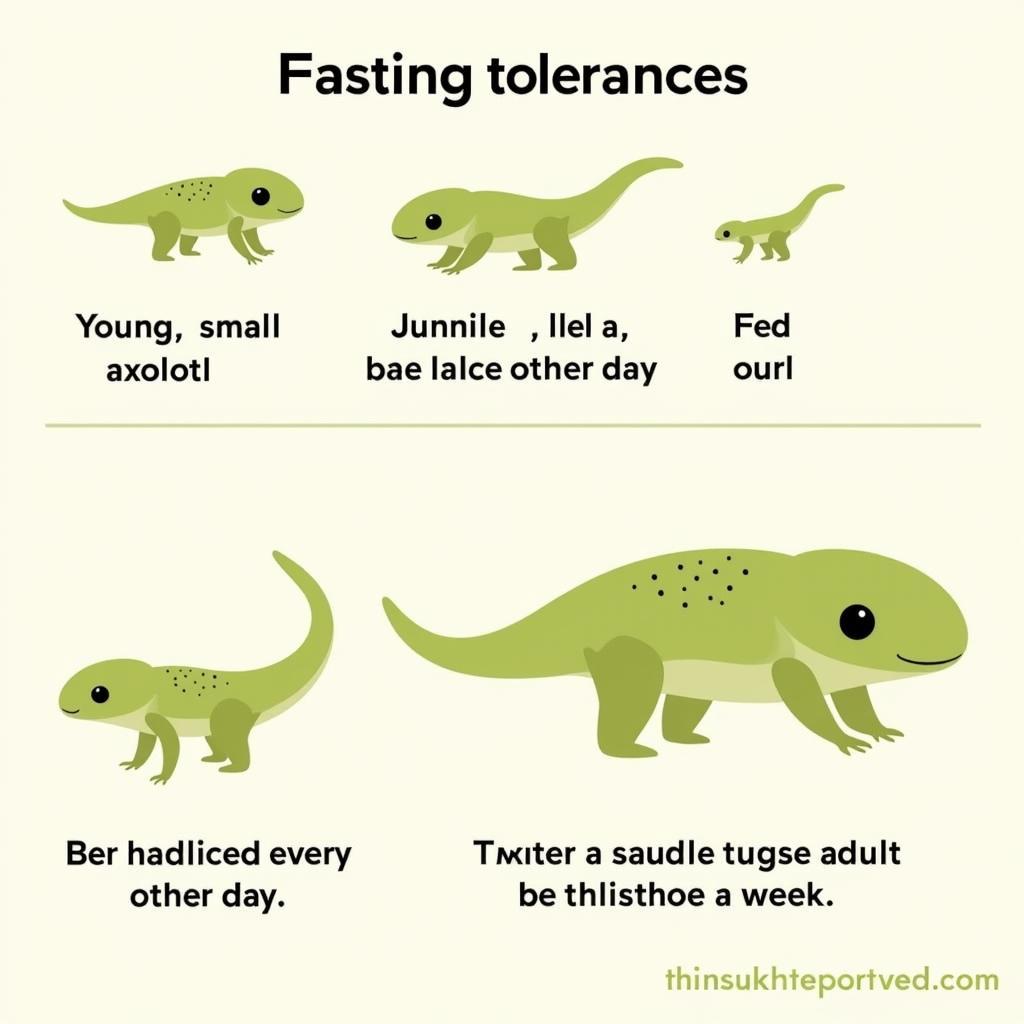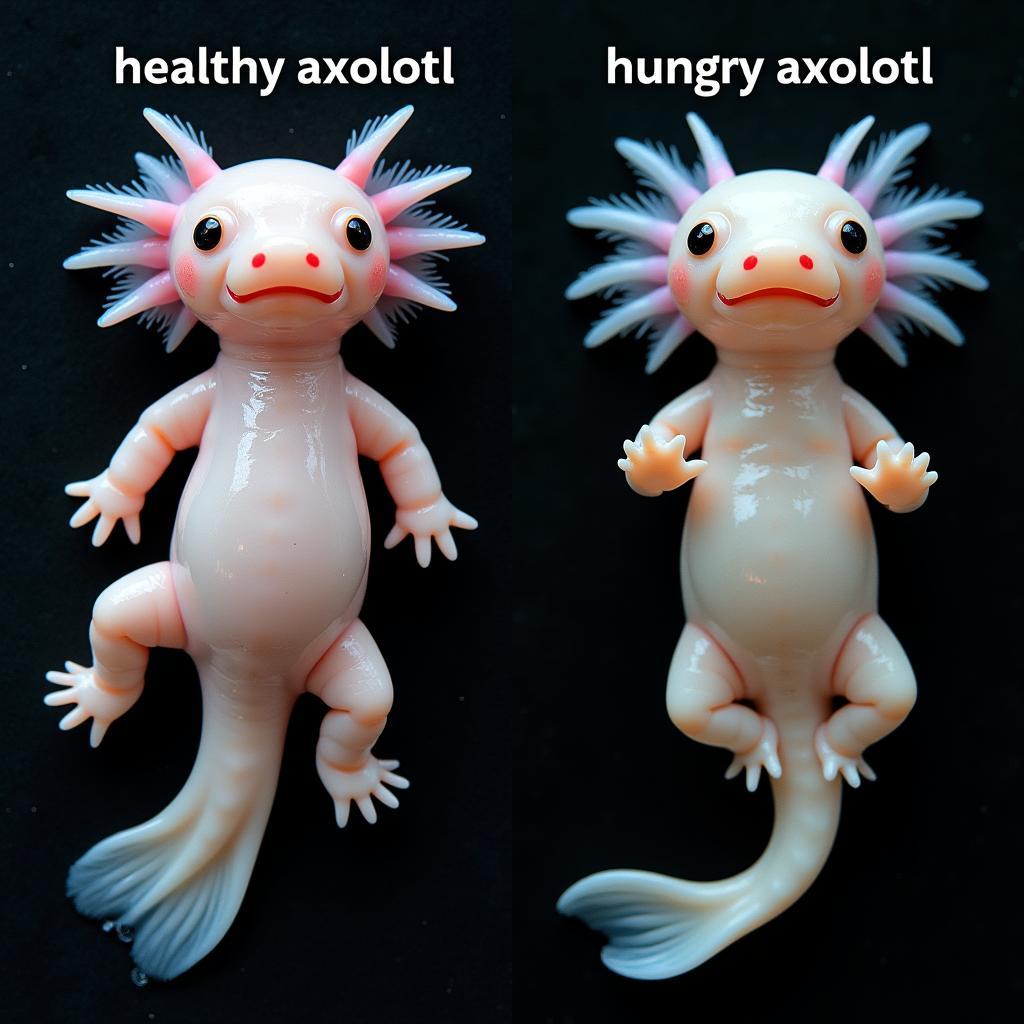Axolotls, those captivating aquatic salamanders, are fascinating creatures, and understanding their dietary needs is crucial for their well-being. So, How Long Can Axolotls Go Without Food? The answer, like many things in the animal kingdom, isn’t a simple one. It depends on several factors including age, size, water temperature, and overall health. Let’s delve into this important aspect of axolotl care.
Factors Affecting an Axolotl’s Fasting Ability
Age and Size
Younger axolotls, still growing rapidly, require more frequent feedings and cannot go as long without food as adults. Baby axolotls should be fed daily, while juveniles can be fed every other day. Adult axolotls, generally over 18 months old, can tolerate longer periods between meals. Larger, more mature axolotls can generally withstand longer fasting periods compared to smaller, younger ones. This is due to their larger energy reserves and slower metabolism.
Water Temperature
Water temperature plays a significant role in an axolotl’s metabolism. In cooler water, their metabolism slows down, meaning they require less food. Conversely, in warmer water, their metabolism speeds up, requiring more frequent feeding. The ideal temperature range for axolotls is between 60-68°F (16-20°C).
Overall Health
A healthy axolotl can withstand fasting better than one experiencing stress, illness, or recovering from an injury. A sick axolotl might have a decreased appetite and difficulty digesting food. If your axolotl exhibits signs of illness, consult a veterinarian specializing in exotic pets.
 Axolotl Fasting Based on Age and Size
Axolotl Fasting Based on Age and Size
How Long Can an Axolotl Go Without Food: A General Guideline
While specific circumstances vary, a healthy adult axolotl can typically go without food for up to two weeks. However, it’s not recommended to push this limit regularly. Juveniles can typically go without food for about a week, while baby axolotls should be fed daily. Keep in mind these are general guidelines, and observation is key. Monitor your axolotl for signs of stress or weight loss.
Observing Your Axolotl During Fasting
Even if your axolotl falls within the typical fasting period, it’s crucial to monitor them closely. Look for signs of hunger, such as increased activity near feeding times or attempting to eat anything in the tank, including gravel or decorations. Lethargy, weight loss, or a sunken belly are signs that your axolotl needs food.
 Healthy vs. Hungry Axolotl
Healthy vs. Hungry Axolotl
When to Worry: Signs of Trouble
While some fasting is tolerable, extended periods without food can be detrimental to an axolotl’s health. If your axolotl hasn’t eaten in over two weeks and exhibits any of the following signs, consult a veterinarian immediately:
- Significant weight loss
- Lethargy or lack of movement
- Sunken belly
- Loss of gill filaments
- Pale or discolored skin
“Axolotls are hardy creatures, but neglecting their dietary needs can lead to serious health issues,” says Dr. Emily Carter, a renowned veterinarian specializing in exotic amphibians. “Regular monitoring and a proper feeding schedule are vital for their well-being.”
Conclusion: Prioritizing Your Axolotl’s Health
Understanding how long axolotls can go without food is essential for responsible pet ownership. While they can tolerate short fasting periods, providing regular meals is crucial for their health and longevity. By monitoring your axolotl’s behavior, you can ensure they receive the proper nutrition and thrive in their aquatic environment. Remember, a well-fed axolotl is a happy axolotl! How long can axolotls go without food ultimately depends on several factors. Always prioritize their health and consult a veterinarian if you have any concerns.
FAQ
- How often should I feed my adult axolotl?
- What should I do if my axolotl isn’t eating?
- Can axolotls eat fish?
- What are the signs of a healthy axolotl?
- How can I tell if my axolotl is stressed?
- What is the ideal water temperature for an axolotl?
- How long can baby axolotls go without food?
You might also be interested in our other articles on axolotl care, including “Axolotl Tank Setup: A Beginner’s Guide” and “Common Axolotl Diseases and Treatments.”
Need help with your axolotl? Contact us! Phone: 02437655121, Email: minacones@gmail.com Or visit us at: 3PGH+8R9, ĐT70A, thôn Trung, Bắc Từ Liêm, Hà Nội, Việt Nam. We have a 24/7 customer support team.